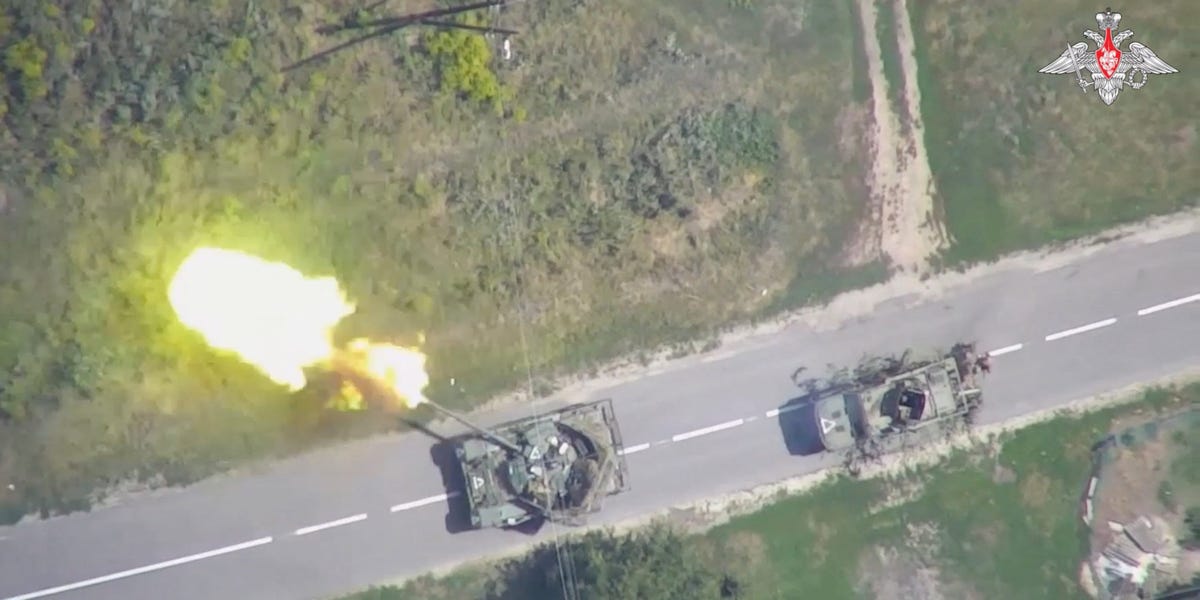- Ukrainian forces launched a surprise offensive into Russia’s Kursk region last Tuesday.
- They have captured around 1,000 square kilometers of Russian land so far, Kyiv’s top general said.
- That figure is almost as much territory as Russia has seized in Ukraine this year.



Not against tanks which would be why the royal dragoons switched to tanks.
WWII has seen very fast evolution of warfare approaches. What Germans did in the beginning of the war was roughly similar to what Russians and Ukrainians have learned to do in the last few months. And if we consider that nobody had the brains to come to that theoretically, not NATO countries, not Israel, not even Iran with friends (who were the closest), then it becomes intuitively understandable why German military of those days is considered so genial - it went to war with the right premises (but with clearly fallacious overarching strategy) in the first place. Of course, Tukhachevsky and a few others have written about similar ideas, but didn’t get the chance to actually employ them. What the end of the war looked like was the same thing conceptually, but scaled for full industrial potential of all sides.
Most historians I’ve read consider ww1 to have had a far greater evolution, starting with napoleonic tactics and ending with rolling artillery barrages and tanks.
However, I’m not sure of the point you’re looking to make here. I mean, the polish army sending cavalry against the germans was an act of wild desperation. I think thats the point they were making there.
Strictly speaking, just like in any war, they’ve just forgotten\ignored most of wisdom present in all wars since Sargon the Great. As humans always do.
Specifically, say, human wave attacks at entrenched positions with machine guns were not a thing of somebody not understanding the results. There were plenty of works written at that point about what warfare should be, it’s just that their authors wouldn’t get promotions in peacetime. Actual commanders had plenty of lives at their disposal without any particular responsibility for those and needed to report some successes. Existential wars between European nations were a forgotten thing, they were either not existential or against a technologically outclassed enemy, so having such people in charge was fine until WWI itself.
But that’s not what I meant, I meant that WWII has that peculiar trait that one of the sides (the one that started the show) was actually properly organized before gaining experience through many deaths. Like 3 critical rolls in a row in DnD, one can say. That’s how they managed to wreak such havoc.
I know that actual contact use of cavalry was obsolete.
Its strange, you reply with the appearance of disagreeing but then say things that don’t refute anything I’ve said and that I broadly agree with.
For sure and even before machine guns, there’s examples of that like the seige of Badajoz which, for its time, was brutal (Napoleonic - like 5k in an hour or something).
To me though, and apologies if you know already, at the Battle of the somme the British army believed the germans to already be dread after days of shelling. As well as this, the many of the british troops were so poorly trained that they ordered mass sections to literally March, with their arms locked out in front of them with the barrel of their rifle pointing upwards, right at German machine guns hoping to charge at the end. Thats literally napoleonic tactics, only they were all “rifles” or light infantry, so they formed skirmishers lines instead of columns. The British artillery stopped shooting for the advance, so that they didn’t shoot their own troops.
By the end of the war, soldiers huddled behind tanks advancing behind a rolling barage. The germans just did it on mass and had the armour more concentrated. One of the reasons they jumped so far ahead is the hard lessons they had suffered towards the end of the war. I mean, it was still a blood bath for everyone but for them it was an even worse blood bath. So, I agree very much with what you’re saying.
My only point I’m making about the speed of change in warfare, to my understanding, is even greater still in ww1.
I wasn’t really disagreeing. Except that guy who wrote as if using horses was something wrong. It’s often not a bad idea even today, especially in mountains.
Fair enough, that makes way more sense.
I think they meant front line cavalry which, tbf, they should have specified.
For sure, I think horses, donkys and mules are still the best way to carry large supplies for fighting deep in jungles too. Well, outside of helicopters but they’re not ad good at hiding under the jungle canopy. So, I 100% agree. I was just letting you know.